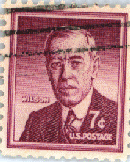FRtR > Outlines > American History (1990) > Chapter Seven > America enters World War I (2/13)
An Outline of American History (1990)
Chapter Seven
America enters World War I (2/13)
< Previous Page * Next Page >
Nine days later, the German government gave notice that
unrestricted submarine warfare would be resumed. On April 2,
1917, after five American vessels had been sunk, Wilson asked
Congress for a declaration of war. Immediately the American
government set about mobilizing its military resources and its
industry, labor, and agriculture. By October 1918, an American
army of over 1,750,000 soldiers was in France.
The American navy was crucial in helping the British break
the submarine blockade, and in the summer of 1918, during a
long-awaited German offensive, fresh American troops played a
decisive role on land. In November, an American army of over a
million took an important part in the vast Meuse-Argonne
offensive, which cracked the vaunted Hindenburg line.
 Wilson contributed greatly to an early conclusion of the war
by defining the war aims of the Allied powers, and by insisting
that the struggle was being waged not against the German people
but against their autocratic government. His famous
Fourteen
Points, submitted to the Senate in January 1918 as the basis for
a just peace, called for abandonment of secret international
understandings, a guarantee of freedom of the seas, the removal of
economic barriers between nations, reduction of national
armaments, and an adjustment of colonial claims with due regard to
the interests of the inhabitants affected. Other points sought to
assure self-rule and unhampered economic development for
European nationalities. The Fourteen Points formed the keystone of
Wilson's arch of peace-the formation of an association of
nations to afford "mutual guarantees of political independence
and territorial integrity to great and small states alike."
Wilson contributed greatly to an early conclusion of the war
by defining the war aims of the Allied powers, and by insisting
that the struggle was being waged not against the German people
but against their autocratic government. His famous
Fourteen
Points, submitted to the Senate in January 1918 as the basis for
a just peace, called for abandonment of secret international
understandings, a guarantee of freedom of the seas, the removal of
economic barriers between nations, reduction of national
armaments, and an adjustment of colonial claims with due regard to
the interests of the inhabitants affected. Other points sought to
assure self-rule and unhampered economic development for
European nationalities. The Fourteen Points formed the keystone of
Wilson's arch of peace-the formation of an association of
nations to afford "mutual guarantees of political independence
and territorial integrity to great and small states alike."
By the summer of 1918, when Germany's armies were being
beaten back, the German government appealed to Wilson to
negotiate on the basis of the Fourteen Points. After assuring
himself that the request came from representatives of the people
rather than of the military clique, the President conferred with the
Allies, who acceded to the German proposal. On this basis, an
armistice was concluded on November 11.
< Previous Page * Next Page >
 Wilson contributed greatly to an early conclusion of the war
by defining the war aims of the Allied powers, and by insisting
that the struggle was being waged not against the German people
but against their autocratic government. His famous
Fourteen
Points, submitted to the Senate in January 1918 as the basis for
a just peace, called for abandonment of secret international
understandings, a guarantee of freedom of the seas, the removal of
economic barriers between nations, reduction of national
armaments, and an adjustment of colonial claims with due regard to
the interests of the inhabitants affected. Other points sought to
assure self-rule and unhampered economic development for
European nationalities. The Fourteen Points formed the keystone of
Wilson's arch of peace-the formation of an association of
nations to afford "mutual guarantees of political independence
and territorial integrity to great and small states alike."
Wilson contributed greatly to an early conclusion of the war
by defining the war aims of the Allied powers, and by insisting
that the struggle was being waged not against the German people
but against their autocratic government. His famous
Fourteen
Points, submitted to the Senate in January 1918 as the basis for
a just peace, called for abandonment of secret international
understandings, a guarantee of freedom of the seas, the removal of
economic barriers between nations, reduction of national
armaments, and an adjustment of colonial claims with due regard to
the interests of the inhabitants affected. Other points sought to
assure self-rule and unhampered economic development for
European nationalities. The Fourteen Points formed the keystone of
Wilson's arch of peace-the formation of an association of
nations to afford "mutual guarantees of political independence
and territorial integrity to great and small states alike."